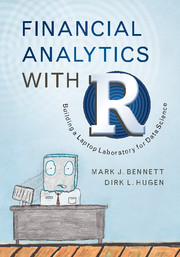Book contents
- Frontmatter
- Dedication
- Contents
- Preface
- Acknowledgments
- 1 Analytical Thinking
- 2 The R Language for Statistical Computing
- 3 Financial Statistics
- 4 Financial Securities
- 5 Dataset Analytics and Risk Measurement
- 6 Time Series Analysis
- 7 The Sharpe Ratio
- 8 Markowitz Mean-Variance Optimization
- 9 Cluster Analysis
- 10 Gauging the Market Sentiment
- 11 Simulating Trading Strategies
- 12 Data Exploration Using Fundamentals
- 13 Prediction Using Fundamentals
- 14 Binomial Model for Options
- 15 Black–Scholes Model and Option-Implied Volatility
- Appendix Probability Distributions and Statistical Analysis
- References
- Index
1 - Analytical Thinking
Published online by Cambridge University Press: 20 October 2016
- Frontmatter
- Dedication
- Contents
- Preface
- Acknowledgments
- 1 Analytical Thinking
- 2 The R Language for Statistical Computing
- 3 Financial Statistics
- 4 Financial Securities
- 5 Dataset Analytics and Risk Measurement
- 6 Time Series Analysis
- 7 The Sharpe Ratio
- 8 Markowitz Mean-Variance Optimization
- 9 Cluster Analysis
- 10 Gauging the Market Sentiment
- 11 Simulating Trading Strategies
- 12 Data Exploration Using Fundamentals
- 13 Prediction Using Fundamentals
- 14 Binomial Model for Options
- 15 Black–Scholes Model and Option-Implied Volatility
- Appendix Probability Distributions and Statistical Analysis
- References
- Index
Summary
As an investor, there is no more immediate feeling of excitement than a stock split during a bull market or an acquisition that can bid one's stock up by 20 percent in a day. Maybe it is something like the feeling a soccer forward gets after completing a kick into the goal. Even though semi-random events can risk the desired outcome (specifically, actions by the defenders between the goal and the forward), all of the practice and preparation for the offense is being applied quickly, and the result of success is appreciated by the fans. In a nutshell, when faced with risks, preparation makes success more probable.
This book is all about that preparation. Being one step closer to paying for one's child's college education, or replacing one's employment income as the prospect of retirement looms, makes us feel more financially secure. Financial analytics involves, among other analysis, the creation of forecasted scenarios based upon historical data using simulations. When amateur investors talk about stocks in a qualitative sense – for example, “Hey, Qualcomm is really rocking lately, bud!” or “Hey, I bought some Intuitive Surgical and it's really on a roll!” – this is the way we naturally interact: informal advice. We are human and need to feel our way through many situations. But the question to ask one's self quietly is: “Sure, that sounds like a good investment that you are telling me about, but is there an alternative investment that will do better than that based on historical evidence?” What would a financial analytics approach tell us from a purely objective perspective? As we practice financial analytics, like the soccer forward practicing goal kicking, we are trained, informed, and more prepared for unexpected situations.
Along with robust and accurate data, designing models is a key component of the professional practice of analytics. This book focuses on mastering some of the most important applied models so that they can be adapted, relied upon, and expanded. Models are presented using hand-written code in the R language, using historical market datasets to gain a deeper understanding of the behavior.
Coined from “Big Science,” “Big Data” is a term used to describe datasets that are too large to fit into common memory and disk hardware and traditional files and relational databases. Sophisticated algorithms and processing are often required to analyze Big Data.
- Type
- Chapter
- Information
- Financial Analytics with RBuilding a Laptop Laboratory for Data Science, pp. 1 - 6Publisher: Cambridge University PressPrint publication year: 2016



